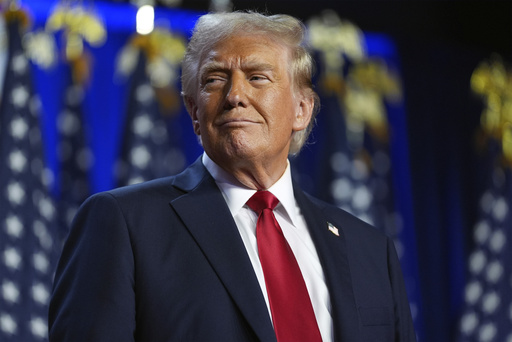
WASHINGTON — The potential for Donald Trump to secure a second term as president, coupled with the Republican revival in the U.S. Senate, could result in the reversal of numerous national climate policies designed to mitigate greenhouse gas emissions, according to experts focused on climate solutions.
Experts highlight several effective measures that correspond to the policies Trump has indicated he may target, including President Joe Biden’s significant climate legislation that allocates funds toward sustainable energy initiatives. These also encompass regulations enforced by the Environmental Protection Agency (EPA) aimed at curbing emissions of methane, a potent greenhouse gas, and limiting pollutants from coal-fired plants as well as exhaust from vehicles.
This policy shift arrives amid escalating climate-related crises, including a rise in fatalities linked to severe heat waves and the recent impact of two exceptionally costly hurricanes on the U.S. economy. International discussions regarding climate adaptation are set to take place next week in Baku, Azerbaijan, but global efforts to enact significant reforms remain insufficient.
During his first presidential term, Trump characterized climate change as a “hoax” and withdrew the United States from the 2015 Paris Climate Agreement, a global pact aimed at reducing carbon emissions. He has reiterated his intention to abandon this agreement again, arguing that it is unenforceable and disproportionately benefits countries like China while neglecting U.S. interests. Furthermore, Trump has promised to eliminate wind power subsidies introduced under the 2022 climate law and roll back efficiency regulations for household appliances implemented during the Biden administration.
Trump summarizes his energy policy with the phrase “drill, baby, drill,” indicating his commitment to dismantling what he describes as the Democrats’ “green new scam” in favor of expanding fossil fuel production, which is a primary contributor to climate change.
Dan Jasper, a senior policy advisor at Project Drawdown, noted that significant rollbacks of federal climate policy are on the horizon but emphasized that climate action could persist at state and local levels. He warned that repealing portions of the climate legislation might be counterproductive, as many investments and jobs are situated in Republican districts, where reducing emissions by approximately 40% by 2030 was anticipated if the law proceeds as planned.
On a call Wednesday, Scott Segal, leader of a communications group at Bracewell LLP, representing the energy sector, expressed doubt that the climate legislation would face complete repeal.
Should Trump attempt to target the climate law, certain provisions may remain protected, particularly credits for advanced manufacturing perceived as beneficial for U.S. business interests. Energy expert David Shepheard from global consultancy Baringa indicated that such policies may endure, regardless of shifting political climates.
Conversely, a newly announced EPA regulation requiring coal-fired power plants to capture a significant portion of their carbon emissions or face shutdowns is likely to be more susceptible to removal under a Trump administration. This regulation was projected to prevent billions of metric tons of carbon dioxide emissions, along with reducing various harmful pollutants through 2047.
Should Trump take office again, the Justice Department would likely be less inclined to uphold EPA regulations aimed at limiting emissions from power plants and oil drilling activities, amidst legal battles initiated by industry groups and Republican-led states against multiple EPA regulations.
The future leadership of the EPA remains uncertain; however, it is expected that the agency will initiate a comprehensive review process to repeal and modify numerous Biden-era standards, including those governing vehicle emissions, which Trump inaccurately characterizes as an “electric vehicle mandate.” Trump previously rolled back over 100 environmental regulations, a figure that may increase during another term.
Trump is poised to reinstate drilling activities in the Arctic National Wildlife Refuge, reigniting a contentious debate that has endured for decades, particularly as previous Democratic administrations have stalled drilling projects to protect wildlife such as polar bears and caribou. While Trump initiated a drilling program in 2017, actual drilling in the refuge has yet to materialize.
Zara Ahmed, director of policy analysis and science strategy at Carbon Direct, asserted, “Elections have consequences,” foreseeing a sweeping rollback in climate-related initiatives and a decline in U.S. climate leadership, possibly including an exit from the Paris Agreement and alterations to the Inflation Reduction Act.
Despite potential setbacks at the federal level, Ahmed remains hopeful that states like California will lead in establishing environmental standards and promoting emissions transparency while pursuing decarbonization efforts.
Executive Director of the Clean Air Task Force, Armond Cohen, echoed these sentiments, asserting that municipalities, utility companies, and businesses committed to reaching net-zero emissions will persist in their endeavors, catalyzing unprecedented installations of renewable energy sources such as wind and solar. Furthermore, an interest in nuclear energy as a carbon-neutral power solution is echoed by governors across party lines, Cohen indicated.
Trump has expressed a desire to pursue advancements in nuclear reactor technology, seeking smaller prototypes in comparison to existing models.
Gina McCarthy, a former EPA administrator and Biden’s first national climate advisor, argued that Trump would be unable to halt the progress of renewable energy sources such as wind, solar, and geothermal. “The transition to clean energy is inevitable and our nation will not regress,” McCarthy asserted. She emphasized that advocates for clean energy are well-organized and bipartisan, committed to providing effective climate solutions while enhancing local economies and promoting climate ambition. “We will not allow Trump to obstruct our children’s and grandchildren’s right to live in safer, healthier communities.”
